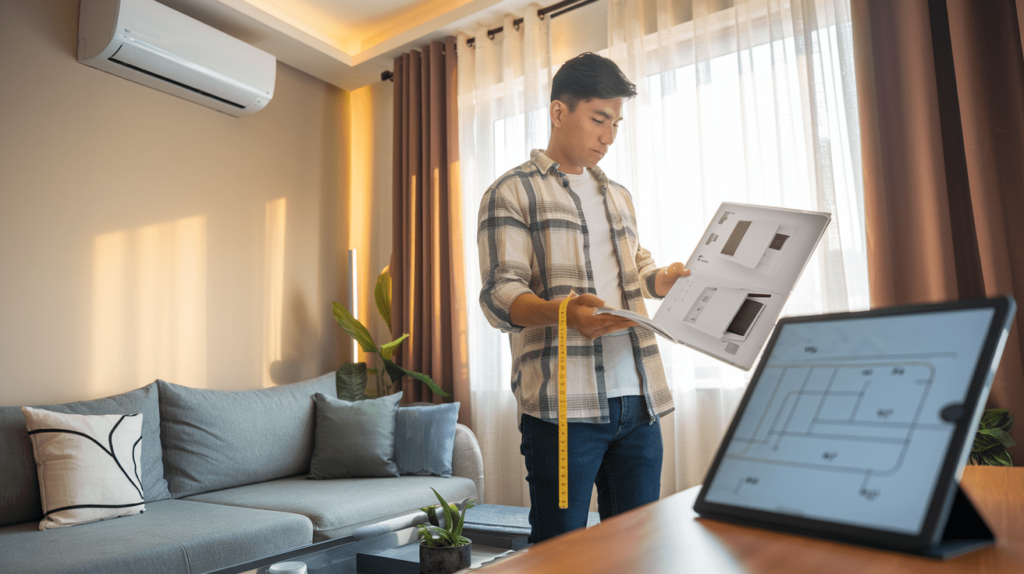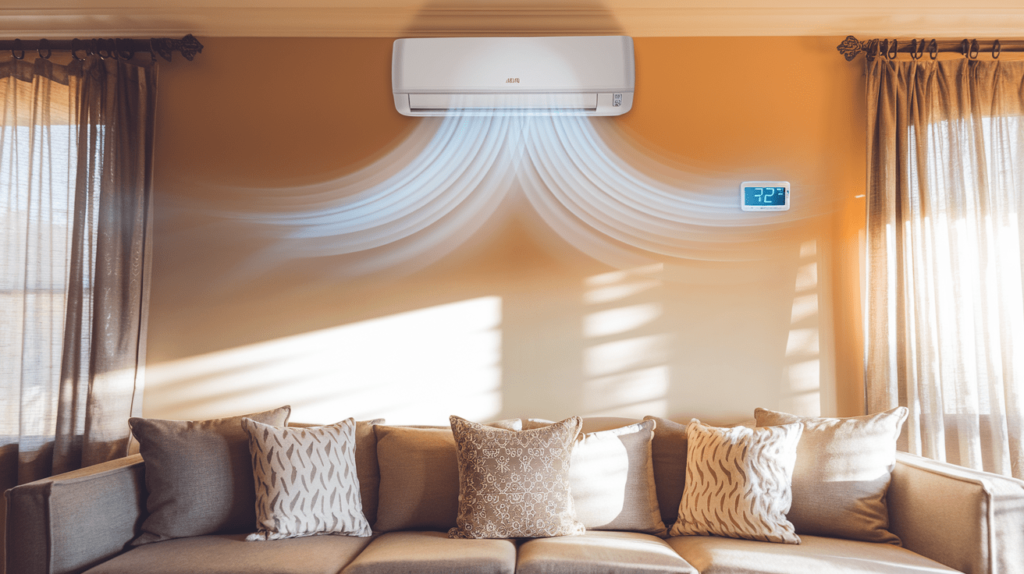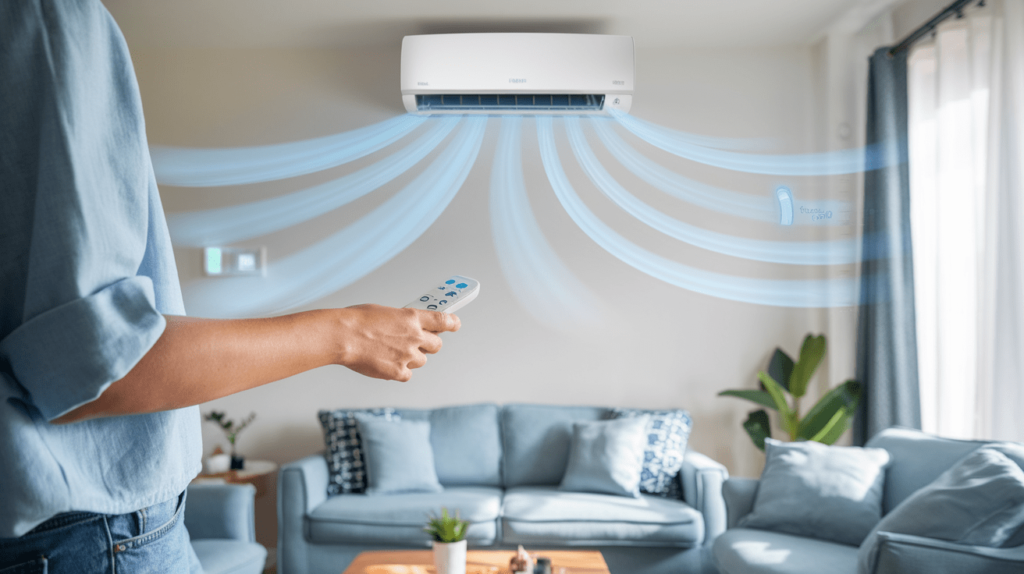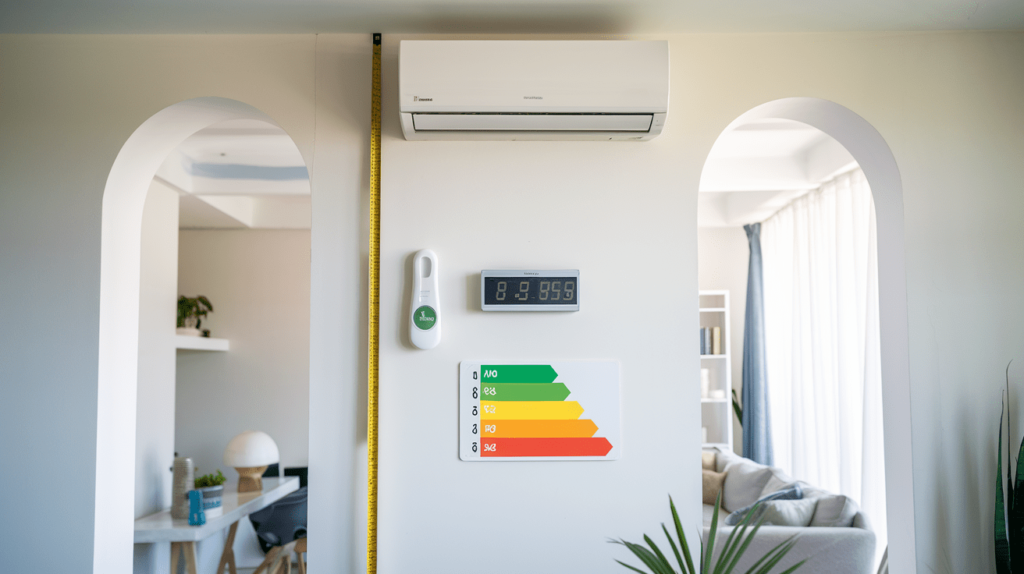Blog, Home Appliances
How to Choose the Perfect Air Conditioner for Home: 5 Essential Factors Most Buyers Overlook
Table of Contents
ToggleThe Overlooked Size Factor: Finding Your Perfect Fit
Why Room Dimensions Matter More Than You Think When Choosing AC for Home
Most homeowners make a critical mistake when shopping for an AC unit – they grab whatever’s on sale or whatever the salesperson recommends. But here’s the truth: your room’s dimensions are the foundation of your entire cooling system.
Think about it. A 100 sq. ft. bedroom needs drastically different cooling power than a 400 sq. ft. open living area. Getting this wrong means either freezing in your own home or watching your electricity bill skyrocket while still feeling sweaty.
Calculating AC BTU Requirements Correctly when Choosing AC for Home
Heat capacity measurements tell us how effectively your air conditioner can cool a space. The calculation is straightforward:
-
Basic formula: 20 BTU per square foot
-
Add 600 BTUs for each person regularly in the room
-
Add 1,000 BTUs for sun-facing rooms
For example, a 300 sq. ft. bedroom for two people needs:
-
300 × 20 = 6,000 BTUs (base)
-
+1,200 (two people)
-
Total: 7,200 BTUs
The Dangers of Oversized Units
Bigger isn’t better with air conditioners. An oversized unit:
-
Cools too quickly and shuts off before dehumidifying
-
Creates uneven temperature spots throughout the room
-
Wears out faster from constant cycling
-
Wastes energy and money
When Smaller Actually Performs Better
A properly sized (or slightly smaller) unit will:
-
Run longer cycles, removing more humidity
-
Maintain consistent temperatures
-
Last longer with fewer repairs
-
Use less electricity over time
The sweet spot isn’t the biggest unit you can afford – it’s the right-sized one that matches your space perfectly.
Energy Ratings explained for Your Air Conditioner for Home
In India, the Bureau of Energy Efficiency (BEE) star rating is also used to help buyers decide based on the energy efficiency of the air conditioners. This was a way that consumers could become empowered and choose energy-efficient appliances.
BEE Star Rating System
EER, COP and ISEER: The BEE has a star rating of 1 to 5 stars for air conditioners, where 5 stars is the most efficient:
1-star: Least efficient
5-star: Most efficient
This calculation is based on the Indian Seasonal Energy Efficiency Ratio (ISEER) which is a value that measures the cooling efficiency of an AC under the Indian summer.
ISEER Rating
ISEER took over from the previous metric EER on 1st January 2016, to provide better representation of annual energy usage compared to EER in the high ambient temperature prevalent in India. It considers:
- Performance at various temperatures
- Seasonal variations in usage
- Part-load operations
The range of ISEER is 3.1 to 5.2 where higher value represents higher efficiency.
Current Standards (2023-24)
For split ACs (most used type):
5-star rating: ISEER ≥ 5.0
4-star rating: ISEER 4.5-4.99
3-star rating: ISEER 4.0-4.49
2-star rating: ISEER 3.5-3.99
Rating: 1 star ISEER 3.15-3.49
These requirements are raised from time to time, in order that the manufacturer will remain tasked with enhancing their efficiency.
Advantages of a higher star rating
Although higher rated ACs are more expensive to purchase at the outset, you save big:
- A 5-star rated AC consumes around 20-30% less electricity in comparison to a 3-star one
- The price premium typically returns within 2-3 years through reduced electricity bills
- Less energy also equals less in helping the environment and the natural world.
Noise Levels and Their Impact on Daily Life

Decibel Ratings Demystified
Ever tried watching TV while your AC sounds like a jet engine taking off? Not fun.
Decibel (dB) ratings tell you exactly how loud an air conditioner will be. Here’s what those numbers actually mean:
| Decibel Level | What It Sounds Like | Impact |
|---|---|---|
| Below 50 dB | Quiet conversation | Barely noticeable |
| 50-60 dB | Normal conversation | Noticeable but not disruptive |
| 60-70 dB | Vacuum cleaner | Can interfere with conversation |
| Above 70 dB | Busy traffic | Disruptive to daily activities |
Most modern units fall between 50-60 dB, but premium models can go as low as 40 dB. That’s quieter than your refrigerator!
Strategic Placement to Minimize Sound Disruption
The spot where you install your AC makes a huge difference in noise levels.
Avoid placing units near bedrooms or home offices if possible. If you’re using window units, consider which rooms need the most quiet. For central systems, have the outdoor condenser installed away from patios or areas where you spend time outdoors.
Mounting brackets with rubber padding can reduce vibration noise significantly. And never underestimate the value of a solid fence or some strategic landscaping around outdoor units.
Modern Quiet Technologies Worth Investing In
Today’s quietest ACs use some pretty cool tech:
-
Variable-speed compressors that adjust output instead of the constant on/off cycling
-
Insulated compressor compartments that muffle operational sounds
-
Fan blade designs inspired by owl wings (seriously!) for whisper-quiet operation
-
Smart zoning systems that run at lower, quieter speeds most of the time
Yes, these features cost more upfront, but your sanity is worth the investment.
How Noise Affects Sleep Quality
AC noise doesn’t just annoy you—it actually disrupts your sleep cycles.
Studies show that nighttime noises above 50 dB can prevent you from reaching deep, restorative sleep stages. Over time, this leads to daytime fatigue, reduced cognitive function, and even health problems.
White noise from an AC can be beneficial if it’s consistent and relatively quiet. But the jarring sounds of an AC cycling on and off? That’s a recipe for tossing and turning all night.
For bedrooms, prioritize units with night modes and consistent sound signatures over raw cooling power. Your brain will thank you.
Installation Requirements and Hidden Costs

A. Electrical Infrastructure Considerations
Most homeowners don’t realize that their existing electrical setup might not handle a new AC unit. Your home’s electrical panel needs enough capacity for that power-hungry system you’re eyeing. Older homes typically have 100-amp service, which could max out with a larger AC unit.
Before you swipe that credit card, check:
-
Does your panel have available breaker space?
-
Can your wiring handle the amperage requirements?
-
Will you need a dedicated circuit (hint: you probably will)
A professional electrician might charge $300-$800 just to upgrade your panel if needed. That’s a shock you don’t want after purchasing your unit!
B. Future Maintenance Accessibility
The placement of your unit determines how much you’ll spend on maintenance for years to come.
Smart homeowners ensure:
-
24″ clearance around outdoor units
-
Easy filter access (not requiring tools)
-
Service panel accessibility
-
Room for coil cleaning
Poor placement can double maintenance costs over the unit’s lifetime and shorten system lifespan by years. Units installed in crawlspaces or tight attics may cost 30-50% more for routine service calls simply due to the extra time required for access.
Smart Features and Compatibility

Which Smart Features Actually Improve Comfort
Smart AC features can feel like a gimmick – until you experience the ones that genuinely make life better.
Temperature scheduling is a game-changer. Instead of waking up sweating or coming home to a sauna, your AC adjusts automatically based on your routines. No more fiddling with settings multiple times a day.
Voice control isn’t just for showing off. When you’re cooking, exercising, or just comfortable on the couch, being able to say “Hey Google, turn down the AC” is surprisingly liberating.
Geofencing might be the most underrated feature. Your AC knows when you’re heading home and starts cooling in advance. By the time you walk through the door, your home is perfectly comfortable – without wasting energy cooling an empty house.
Avoid paying extra for:
-
Fancy lighting effects
-
Social media connectivity
-
Limited proprietary ecosystems
Home Automation Integration Options
The days of standalone smart devices are over. Your AC should talk to everything else in your smart home.
Most quality units now support at least one of these ecosystems:
| Platform | Advantages | Potential Limitations |
|---|---|---|
| Google Home | Wide device compatibility | Occasional voice recognition hiccups |
| Amazon Alexa | Intuitive skills, routines | Requires Echo devices for full features |
| Apple HomeKit | Top-tier security | Limited compatible device selection |
| SmartThings | Excellent automations | More complex setup process |
Look for IFTTT (If This Then That) support – it’s the secret weapon of home automation that connects your AC to weather services, security systems, and even your car.
Remote Diagnostics and How They Prevent Costly Repairs
Remote diagnostics isn’t just a fancy term – it’s a wallet-saver.
Modern smart ACs continuously monitor their own performance. They track things like refrigerant pressure, filter status, and component wear that you’d never notice until something breaks.
When your AC detects an issue developing:
-
You get an alert before major damage occurs
-
The notification often includes specific problem details
-
Many systems automatically schedule maintenance
The math is simple. A $15 part replacement scheduled during regular hours beats an emergency $500 repair plus the cost of hotel rooms when your AC dies during a heatwave.
Some systems even let technicians diagnose problems remotely before arriving, ensuring they bring the right parts on the first visit – no more waiting days for ordered components.
Conclusion
Selecting the right air conditioner involves much more than just picking a brand or model. The perfect AC requires careful consideration of room dimensions to ensure proper cooling capacity, understanding energy efficiency ratings to balance performance with electricity costs, and evaluating noise levels that will affect your home environment. Don’t forget to account for installation requirements and potential hidden costs that could impact your budget significantly.
As you make your decision, prioritize smart features that align with your lifestyle and existing home technology ecosystem. Taking time to evaluate these five crucial factors will save you from common buyer’s remorse and ensure your investment provides optimal comfort for years to come. Remember that the cheapest option upfront may cost more in the long run – choose wisely for both immediate comfort and long-term satisfaction.


